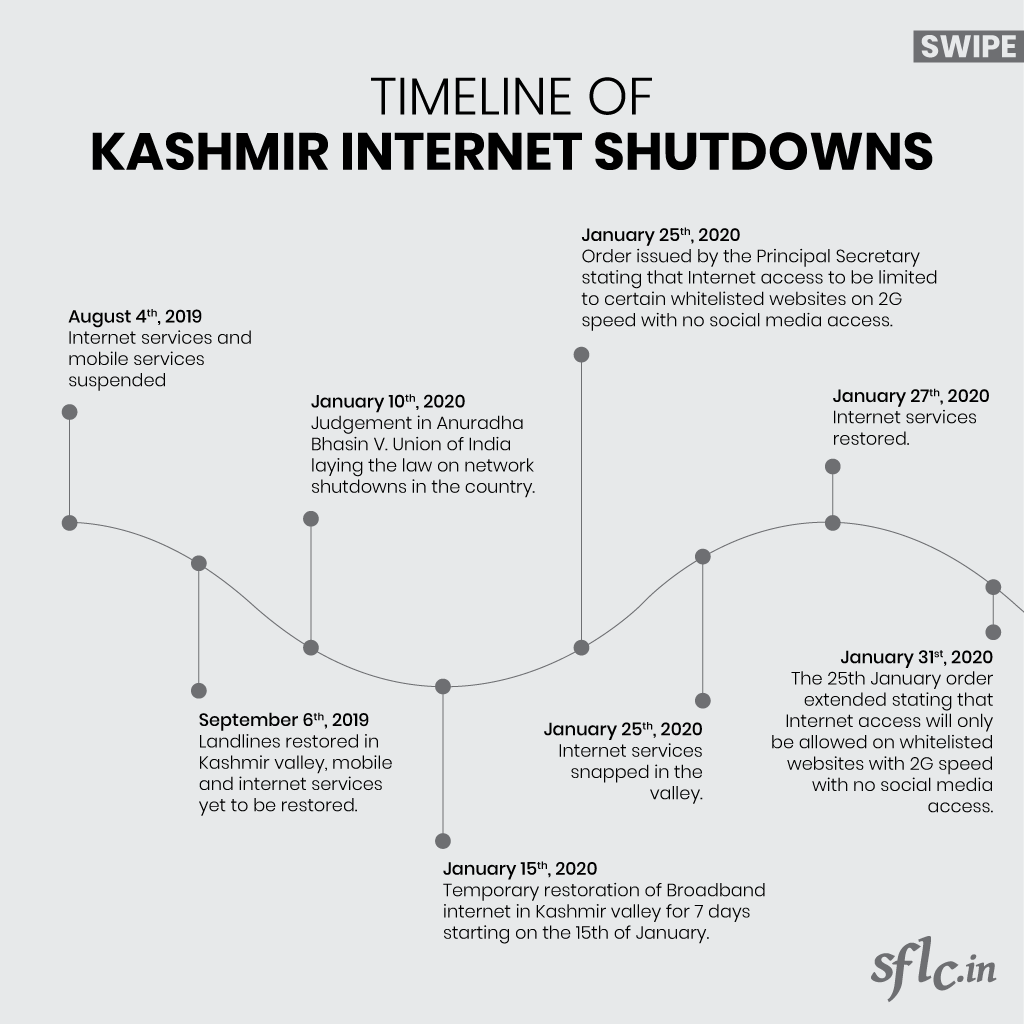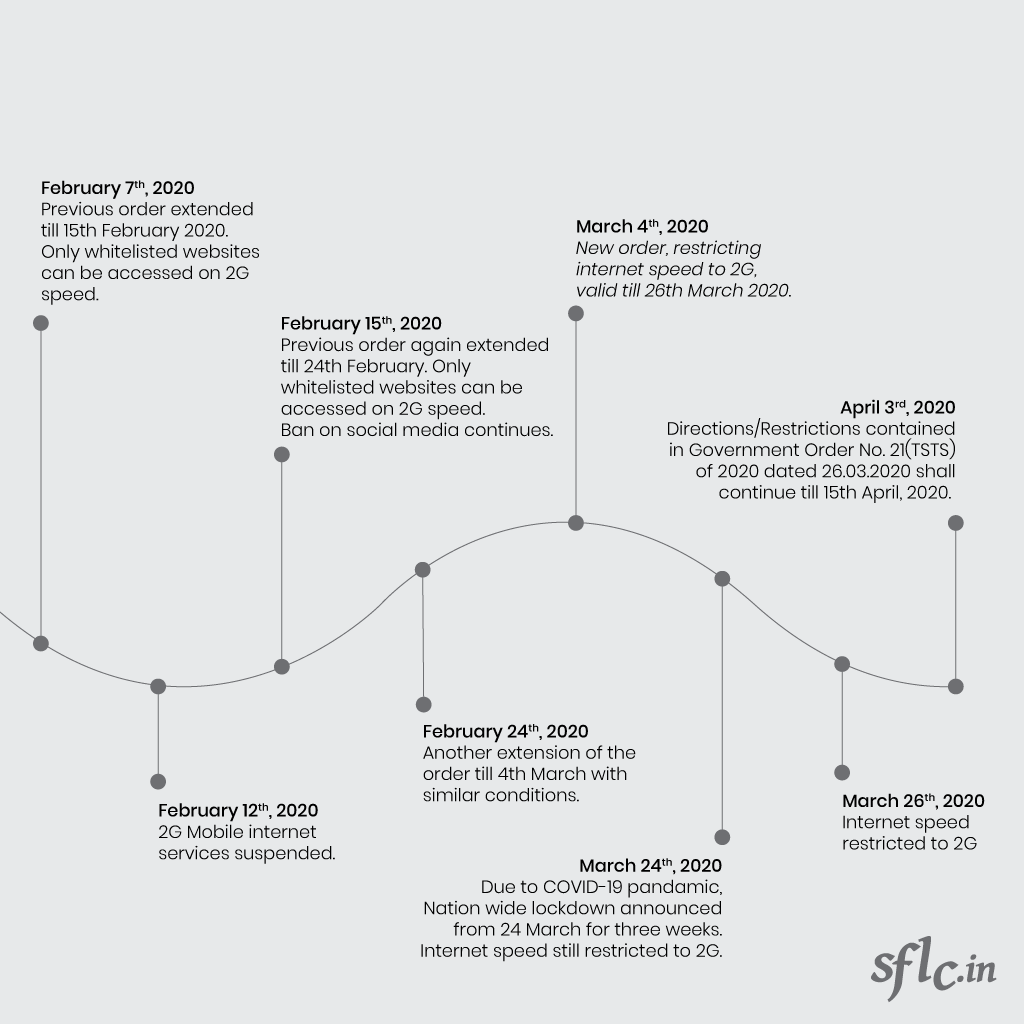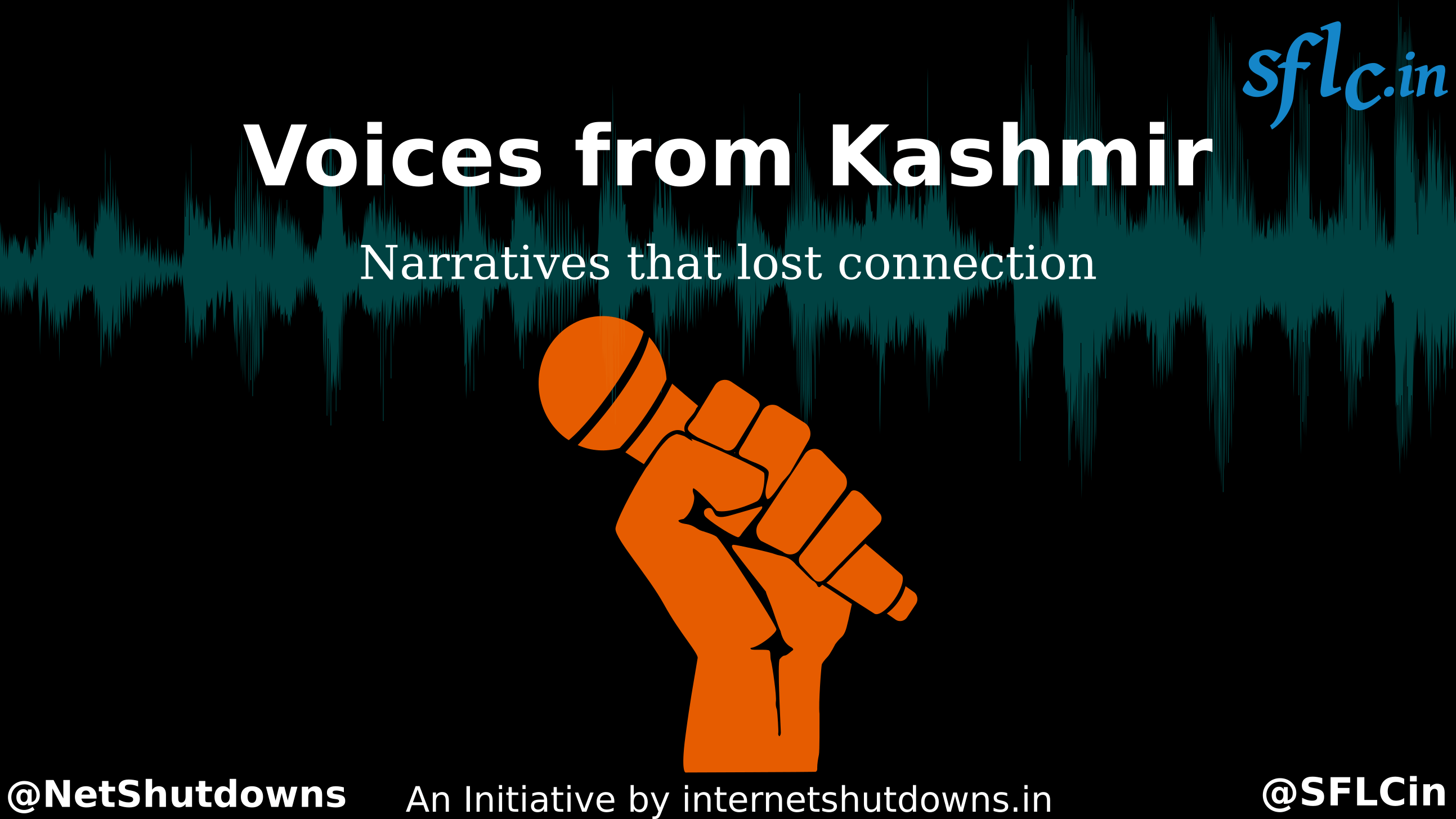It was on the evening of August 4, 2019 that the erstwhile State of Jammu and Kashmir plunged into unprecedented communication darkness. Telephone and Internet connections were snapped in the valley and the next day Article 370, which gave Kashmir a special status, was abrogated. This started the longest communication blockade in the history of a democracy, cutting off Kashmir virtually from the rest of the world. It took exactly 213 days for the Centre to partially restore the internet in the valley, with obsolete 2G technology. This inadequate move was preceded by white listing certain websites raising concerns about net neutrality as well. Both the moves which tantamount to internet suspension were in consonance with the government order, dated March 4, 2020, issued by the Principal Secretary, Home Department, Shaleen Kabra [Government Order No.Home -21(TSTS) of 2020]. Although various civil society organizations and individuals had requested the government to restore 4G Connection, the Principal secretary passed another order extending the previous order till 27th April 2020.


The world right now is dealing with an unprecedented situation called COVID-19 which has been declared a global pandemic by the World Health Organization. The pandemic of extreme contagious nature, has forced almost all the countries in the world to go on a lockdown. Till date there are above 20,00,000 cases in the world out of which more than 12,000 are in India. The Union Territory of Jammu and Kashmir has recorded over 454 cases. COVID-19 which spreads exponentially through social contact, complete lockdown followed by self-isolation is said to be the only best measure against it. Most offices across the globe have shifted to remote work and meetings are being held virtually. Information to fight the pandemic is being circulated online, through Whatsapp bots, through video content, through advisories. It is 2020 and the world is digital, but Kashmir is still living at 250Kbps of speed. Information is a key tool to contain pandemic in view of no treatment or vaccine available. Crucial information if provided to doctors at the right time, can prevent them from making the same mistakes as has been made by the fraternity in other countries in containing the outbreak.
Generally, the internet speed required to perform day-to-day office work including video calls with screen sharing, sending emails with attachments, viewing videos; the internet speed on an average should be between 15-20Mpbs. The internet speed in Kashmir is currently 50 times less than the minimum desired speed.
We have put together some voices which we felt need to be heard to understand the gravity of the situation.
Shayan Banday, Engineer cum entrepreneur
Shayan, a technological engineer cum entrepreneur from Srinagar, Jammu and Kashmir says that even though Kashmiri’s have 2G internet, how can one even call that ‘internet’ given its low-speed? In the words of Shyam, where a pandemic is on the rise and information dissemination is of crucial importance, an information blackout is awful. The need of the hour is for doctors to research and this research has to take place over the internet. He adds further that for Kashmiris with an abominable 2G internet, leisure activities such as streaming Netflix or Hotstar is a distant dream. The only imaginable streaming is of a 144p video in Youtube, that too with constant buffering. When one has to stay at home 24 hours in a day and has no access to the one activity the world has access to, Shyan says, it is bound to affect the mental health of every Kashmiri. One cannot read, download, stream, nothing. Forget leisure, the situation is so abhorrent that a Kashmiri student does not even have access to education. Since Kashmir was under blockade from 5th August 2019, all schools and universities were shut. While they opened merely in March, they were hardly functional for 10 days before the onset of the COVID-19 virus, forcing the entire country to go on lockdown. Shyam talks of how the world is now educating online, with the help of apps such as Zoom, Google Classrooms, etc. But with 2G internet, Kashmiris do not even have access to that. With this, it is evident how the absence of high-speed internet has made life in Kashmir horrid, such that it has been 9 months and a Kashmiri student has had all roads to education blocked.
Waseem Wani, a software engineer from the Jammu and Kashmir working in Uttar Pradesh
Now, with the country-wide 21 day COVID-19 lockdown, Waseem narrates how the mix of this lockdown and network problems in the valley have affected businesses for those, like himself, operating in Jammu and Kashmir. After the lockdown, his company, akin to others, ordered a shut-down and asked employees to work from home, he too headed back home to the valley. However, daily, he experiences a fall in his work efficiency. Since all work is done online, it often takes a lot of time to take note of applications or even watch a tutorial when needed. His company has mandated a google meeting everyday at 9:30am. However, for him, it takes a lot of time to connect with the people which builds to constant frustration. In fact, recently, all employees from his company had an important meeting with the CEO online. Because of network problems, he faced a lot of difficulty in connecting to the meeting. To add to the frustration, while he was only able to join midway, the call continued to constantly disconnect. This dangerous mix, thus, makes him feel very restricted, having an impact not only on his productivity but also his emotional wellbeing. He continues to narrate the danger of this interplay by talking of the impact on health workers and consequent information dissemination in the state. He states that recently, the Ministry of Health and Family Welfare organised an online meeting for health workers to provide guidance on how to operate ventilators for critical patients affected by the COVID-19 virus. Pertinently, the network lockdown prevented the Kashmiri health workers from attending this important meeting. In fact, a prominent Kashmiri doctor reported to the media that while they wished to educate the Kashmiri people about the symptoms of COVID-19 and precautionary measures to be adopted, the low-speed internet barred them from doing something so crucial. He goes on to say that while students were badly affected even before the spread of the virus, their situation is gradually worsened, with access the education greatly hindered. Now, along with predominantly Kashmiri students, those who study outside the valley but have had to come home due to the lockdown are also suffering. While the world is operating on video-conferencing, low-speed internet has drastically impacted the functioning of these students, immensely impacting academics across the state.
Tanzeel Khan, Digital Rights activist
The problems that the people of the valley are facing are expansive and never-ending. For thousands of employees who have been asked to work from home, like Tanzeel himself, it is impossible to get any work done without high-speed internet. He says that attending video-conferences is not possible when you are connected to extremely slow internet. With the COVID-19 threat getting scarier day by day, for him and multiple others, continuing to work from home seems difficult. Further, dozens of businesses which rely solely on the internet have either shut down or moved to other places. Hundreds of people have lost jobs since the communications lockdown was imposed. He talks of how the people of Kashmir continue to remain unaware of the severity of COVID-19 since they do not have access to information online. He criticizes the government and says that in their recent order, they claimed that there is no hindrance to education and medical services due to restrictions on the internet. “But who would ask the people suffering from the ban on high-speed internet?” All schools across the country are shut down. Students of other states are anyway able to continue their education through classes online. But, he strikingly says, “Kashmir is the only place where the government ensures that there is a ban on offline as well as online education.” About 1.5 million students do not have access to online learning facilities. Moreover, with respect to medical facilities, as the COVID-19 cases in Kashmir multiply, the people in the valley do not have access to vital information which can save their lives and help stop the spread of the virus. Consequently, restricting internet access and free flow of information is running contrary to the global fight against COVID-19. While there have been numerous calls from a number of human rights organizations asking India to end this war crime and give people the right to access information and thus, the internet, there seems to be no end to this oppression. “Everything falls on deaf ears.” From his observation, he claims that there prevails a handicap of reportage of human rights violations committed by the armed forces. This is so because when there is no digital avenue available, nor any tools to propagate information, journalists and media houses have been rendered absolutely ineffective. He concludes by making a call to the Indian government to recognize the right to access information and put an end to the internet restrictions in Jammu and Kashmir.
Sayed Suri, Student and activist
He states that he remains outside of Kashmir right now for the past 4-5 years. Recently He discovered this situation when he had to return home without an idea for how long he will be in Kashmir. He talks about how his whole work is dependent on the internet because he has to do a lot of research. He talks about how academia is a completely IT based system. Everybody, from professors to staff communicate through the internet, basically through email. And the modem website is where everything is uploaded, from the course, schedules, guidelines and basically everything. He also talks about how he used social media to stay in touch with people who he can’t meet otherwise. He also states that he is also into social work and social activism. He states that the communication inter valley and outside the valley is completely blocked right now. He says that he reached Jammu and Kashmir on the 23rd of March, same time when the government said that most work should be done at home digitally, whether it is transaction or studies. In accordance, his university took out this notification and informed all the students that they will be having online courses for this semester and it will be held on Zoom. He states that from 23rd March till date he has not attended a single class. He has missed all the classes, even as he is not able to access the module page because on 2G network in Jammu and Kashmir. And sometimes if it may open, it takes 2-3 hours. Otherwise, mostly it says, “out of time” and goes back. He says that digitally handicapped losing out on his education. He says that he is losing all the information which he needs to get from the internet for reading and researching. He also expresses his frustration on not being able to transact digitally.
Yunus Rashid, regional spokesperson for the Jammu and Kashmir Student’s Association
He says that it is unfortunate that in the time of a pandemic, when the whole country is on lockdown and people are compulsorily staying inside their homes following proper advisories and precautions, Kashmir is without proper internet. With 2G speed, they are barely able to download videos or even find essential information about the COVID-19 virus, which is extremely crucial in these times. He talks of how this virus has impacted both students as well as medical practitioners across the valley. As a consequence of the abrogation of Article 370, Kashmiri students had to remain away from school for a period of 8 whole months. Now, as these students were ready to go back to school and resume education, the outbreak pushed them inside their homes once again, that too with just 2G internet. To battle this prolonged shut-down, while the teachers’ community, along the lines of the world, is trying to conduct classes online, conducting as well as attending these classes is a major task because of the slow-speed internet. Along with education, he talks of how doctors are also facing multiple problems. Recounting a recent experience, he quotes how a particular doctor in Kashmir had to wait for more than an hour to download a very important document on the COVID-19 virus. This is thus impacting information dissemination across the valley and thus, COVID-19 precautions and treatment also. Personally, Yunus tries his best to adjust to the slow-speed internet. Before sleeping at night, he puts the requisite file on download and checks for its completion in the morning. He talks of how naturally, this process is very disheartening. He, along with multiple others, continue to hope that 4G internet will be restored across the valley.
A professor who wishes not to be named talks about how it’s difficult for the teachers to take online classes. Some record audio lectures and post them for students and sometimes post reading material. They basically find it very hard to look for ways to upload lectures and make them accessible to students on 2g.
A 1st Year Law student, Ramsha talks about how hard she has been finding to keep up with her classes. She usually connects to her classes via audio instead of video because of bandwidth issues. She points out how her university has been giving her a lot of assignments, projects and other research work and it’s extremely difficult to keep up with the pace on 2g. She says that she eventually ends up spending the entire day studying because research takes double the normal amount of time and this makes the whole pandemic situation worse, mental health wise. Universities in Kashmir haven’t been able to conduct semester exams because of the post August situation and her friends still haven’t given their 1st semester exams and now they are struggling to keep up with online classes. Universities are proposing that they’ll take both 1st and 2nd semester exams together once the situation improves.

The above notice is an example of how there have been restrictions placed on thousands of government servants,
The apparent crisis is not what it seems, it is the disparity in such times which prolongs it.
When the majority of the world is witnessing a huge upswing in internet usage as the current global pandemic pushes a quarter of the world under lockdown, there are still regions apart from Kashmir which are going through information blackout with illegal internet shutdown orders by the authorities.
The Centre did restore the services, but partially, by restricting the internet access to 2G technology and continuing blockade of social media.
Myanmar’s Rakhine province is also going through a similar fate. The Ministry of Transport and Communication directed the four major telecommunications service providers to block countless number of websites including legally registered ethnic media websites, in the name of combating misinformation over COVID.
Similarly, Bangladesh clamped down internet services in Cox’s Bazar where 900,000 Rohingya refugees live.
When people around the world have been ordered to observe self-isolation, access to correct information and precautionary measures are the only life saving tools in the absence of any vaccine and treatment.
{“preview_thumbnail”:”/sites/default/files/styles/video_embed_wysiwyg_preview/public/video_thumbnails/ZGaus0Osiws.jpg?itok=nH55COXC”,”video_url”:”https://youtu.be/ZGaus0Osiws”,”settings”:{“responsive”:1,”width”:”854″,”height”:”480″,”autoplay”:0},”settings_summary”:[“Embedded Video (Responsive).”]}
{“preview_thumbnail”:”/sites/default/files/styles/video_embed_wysiwyg_preview/public/video_thumbnails/h2yP0knyC24.jpg?itok=6MVfK5hb”,”video_url”:”https://youtu.be/h2yP0knyC24″,”settings”:{“responsive”:1,”width”:”854″,”height”:”480″,”autoplay”:0},”settings_summary”:[“Embedded Video (Responsive).”]}
{“preview_thumbnail”:”/sites/default/files/styles/video_embed_wysiwyg_preview/public/video_thumbnails/sDTb3HUMqK4.jpg?itok=ylPLAy4j”,”video_url”:”https://youtu.be/sDTb3HUMqK4″,”settings”:{“responsive”:1,”width”:”854″,”height”:”480″,”autoplay”:0},”settings_summary”:[“Embedded Video (Responsive).”]}
{“preview_thumbnail”:”/sites/default/files/styles/video_embed_wysiwyg_preview/public/video_thumbnails/3ivG0sLzinI.jpg?itok=-1prb2Qo”,”video_url”:”https://youtu.be/3ivG0sLzinI”,”settings”:{“responsive”:1,”width”:”854″,”height”:”480″,”autoplay”:0},”settings_summary”:[“Embedded Video (Responsive).”]}




